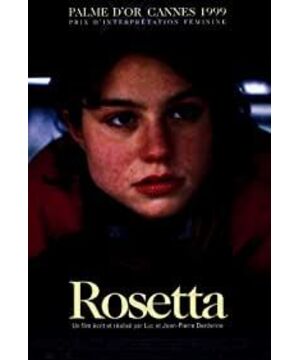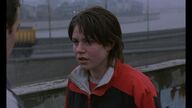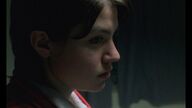For a low-cost film about the life of the low-level people, in terms of form and shooting techniques, the Dardene brothers chose the best documentary shooting method, abandoning the aesthetics and exquisite neat composition and multi-directional editing, and adopted follow-up photography (handheld or Shoulder) and rough scene handling. The overall tone is rapid, depressed, and gross, showing the living conditions of the bottom marginal group in a highly developed capital society-restlessness, numbness, and imprisonment. Speaking of such a form, I have to interject "direct film" and "dogme95 manifesto." "Direct Movies" vigorously abandon fiction and only blindly present and approach the truth; "Dogme95 Declaration" squeezes the reality out of the scenes and characters in a live broadcast style. The film techniques of the Dadené brothers are similar to the two, but "Rosetta" is slightly different. On the one hand, it upholds the style of realism, using natural scenes, lighting and sound effects to present reality without any judgment; on the other hand, it focuses on film writing skills, and expresses inner feelings through the relationship between the scene and the characters, the lens and the audience. mood. The camera lens has become the audience itself. The audience is forced to approach the scenes and characters and even accept the reality carefully created by the director. The fictional plot has become an inescapable reality for the audience without a trace. These two aspects complement each other, presenting a reality that is both objective and reorganized, and does not contradict the unity of form and content. Rosetta naturally became our (audience) friend, our sister, and our relative. Her character, her emotions, and her values... are being stripped away in front of our eyes. It is inevitable that we have to face her life and everything she has encountered with a straight-sighted gaze. , Concern and thinking about human nature.
I thought: Why did Rosetta report Lyonte? Because she wants a job. Why did Leonte give her a job that can earn private money but she refuses to accept it? Because she wants to be a "normal person", she doesn't want to accept help from others, she wants to live with dignity. Yes, I excitedly said "dignity"! When Rosetta saw Lyonte falling into the water and wanted to die, did she ever think of dignity? Although she is able to face life and face the reality sturdily, when life falls into the quagmire of reality and cannot break free, she may first think of the "normal" job she dreams of, and then friendship or love. She was also struggling with pain in her numbness. What can cause all this? The conscience of a girl who was supposed to be innocent and innocent has been materialized by the muddle-headed capital society and is being lost little by little. Dignity is nothing but a white apron put on her, which needs to be captured by despicable dehumanizing means before she can stand in front of people with dignity. It is better to die with such dignity. Sure enough, Rosetta chose to commit suicide.
I thought again: Why did Rosetta go to report Lyonte in such a despicable manner? Because she was so eager to get rid of the miserable life, she had to take a wrong shortcut. Why did she choose to commit suicide again? Because even if you reach the long-awaited shore through the wrong shortcut, life is still fettered as mud and heavy as a corpse, which makes people struggling to break free, but also strenuous to bear. She wanted to die. But she didn't die, she still had to carry the heavy gas. She finally cried out instinctively, and her expression was no longer the dull and hostile nature eroded by the laws of indifference in the real society. At this time, she desperately needed to be understood, but the person next to her was Leonte, who she had hurt. How complicated her psychology should be. She might be crying because she was helpless at the suicide attempt, she might be crying because she was tired of falling into the quagmire of a miserable life again, or she might be moved and tearful because of the love she received. In short, Rosetta is indeed a living person. She is our friend, our sister, our relatives, and the people around us who are burdened with miserable lives.
At the end of the film, there is not much hoped for light, nor is there a very healthy warmth. This just shows that life itself does not have a single fixed formula. If I am you, I would like to ask myself if it feels heavy to bear the burden of such a life? How heavy is it? Will you resist? Will it be as beautiful as Rosetta when facing it?
View more about Rosetta reviews











